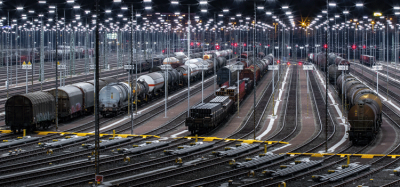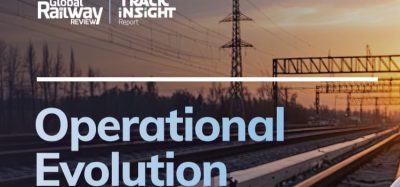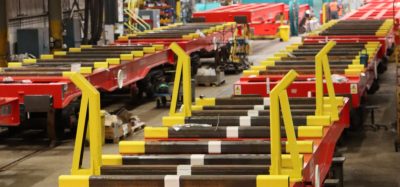Re-engineering Greek railways
Posted: 5 April 2010 | | No comments yet
TRAINOSE S.A. was founded in 2005, initially as a subsidiary of OSE S.A., but became independent of the OSE Group in 2009. Its operational and organisational split from the Hellenic Railways Holding Organisation was part of its initiated restructuring programme to fortify Greece’s railway business and consumer offering in the transnational competitive environment.
TRAINOSE S.A. was founded in 2005, initially as a subsidiary of OSE S.A., but became independent of the OSE Group in 2009. Its operational and organisational split from the Hellenic Railways Holding Organisation was part of its initiated restructuring programme to fortify Greece’s railway business and consumer offering in the transnational competitive environment.
TRAINOSE S.A. was founded in 2005, initially as a subsidiary of OSE S.A., but became independent of the OSE Group in 2009. Its operational and organisational split from the Hellenic Railways Holding Organisation was part of its initiated restructuring programme to fortify Greece’s railway business and consumer offering in the transnational competitive environment.
Today, TRAINOSE, a state owned company, is solely responsible for the provision of passenger and freight transport services in Greece, including suburban railway operations. More specifically, the company operates the national rail network, the greater Athens and Thessaloniki suburban trains, international routes, as well as a Cargo service. Its fleet runs over 500 services per day, covering a nationwide route of over 2,800km. With an approximately 2,000-strong workforce, the Hellenic Railway Operator transports in excess of 15 million passengers and 4.2 million tonnes of freight per year. The Greek railways connect the country’s largest mainland cities but also its smaller towns and its more remote archaeological and cultural sites.
Re-engineering Greek railways
With effect from November 2008, the restructuring strategy was a major part of the stated reform programme of the Hellenic Railways introduced by the Ministry of Transport and Telecommunications. The re-engineering plan entailed the following goals:
A major rescheduling of all routes
From a cost-benefit point of view, a major rescheduling of all routes is considered. The initial plan aimed at increasing routes which presented high passenger demand and decreasing routes which either could not adequately compete to road transportation or steadily demonstrated a very low passenger volume, such as routes of the Peloponnese region and other areas. It is indicative that in such routes employees outnumbering passengers was the standard rule.
Contracting Public Service Obligations
As required by EU legislation, contracting Public Service Obligations (PSOs) with the Greek state was also crucial, since it would allow the continuation of such unpopular routes, routes which are however critical to the Greek government for social or national reasons. This presupposed the founding of the National Railway Authority and entailed the careful, diligent and transparent pricing of all costs involved, including costs of staff, energy, infrastructure, maintenance or even acquisition of rolling stock, plus a reasonable profit.
A two-phase tariff revision
All railway tariffs remained steadily fixed for more than a decade, rendering the train by far the cheapest public transportation. Although TRAINOSE S.A. wanted to retain this important competitive advantage, it was very clear that prices had to increase in order to promote sustainability. With the completion of the two-phase tariff revision, tickets would still be 30% lower than the respective bus fares.
Freight transport logistical synergies and partnerships
Cargo services currently contribute almost 30% to TRAINOSE’s financial results. The company aimed to enter into strategic partnerships with logistics firms attracting key customers, seeking to obtain competitive advantages and better cost management. Scheduled infrastructure improvements are also bound to further enhance the profitability of this business line, providing for direct port connections to the main cargo facility of the company, enabling better management of corporate customers’ needs. In addition, TRAINOSE attempted to penetrate foreign markets, taking initiative for bilateral agreements, such as the one which is currently negotiated between the Greek and Russian operators for the transportation of goods between the two countries.
Passenger services optimisation and promotion
TRAINOSE’s development plan included polishing corporate image by publicly introducing quality auditing and assurance, as well as designing and implementing new friendlier customer care policies. A complete restructuring of the distribution network was also necessary, which entailed reconsidering local offices opening hours and staffing, as well as employing new technologies that would allow sales through the Internet or over the phone. New services, such as cultural, sight-seeing, historic and gastronomic special routes were also designed, taking advantage of Greece’s unique vistas, cuisine and nature. Of course, the absolute prerequisite for all the above strategic goals was considered to be an extensive internal re-engineering. As imposed by the overreaching principles in the EU rail transport law laid down in Article 5 of Directive 91/440;
“Member States shall take the necessary measures to enable railway undertakings to adjust their activities to the Market and to manage those activities under the responsibility of their management bodies, in the interests of providing efficient and appropriate services at the lowest possible cost for the quality of service required. Railway undertaking shall be managed according to principles which apply to commercial companies.”
In this spirit, the Hellenic Railways reform programme introduced a new organisational structure and moved forward to a diligent effort to reduce operational costs through voluntarily retirement schemes, procurement rationalisation, as well as significant amendments of Personnel Regulations to ensure flexibility. A simple example characteristically illustrates the necessity to implement extensive changes in all internal processes: each and every railway station, or point of sales around the country, is outfitted at local stores, purchasing both consumables (paper, ink cartridges, file folders, toilet paper and cleaning materials) as well as capital goods (fax machines, office furniture, air-conditioning appliances) independently. No centralised control is actually involved which would surely cut costs by achieving economy of scale, guarantee transparency and save valuable employee time.
Disappointing results
The major reform programme was carefully designed and could have led to tangible results by now. However, a series of factors has prevented the achievement of the desired results until today.
The programme did not cater for significant issues that still remain unsolved and which appear to be prerequisites for any further actions. TRAINOSE is still in a binding relationship with the OSE Group, more or less obliged to rent assets (such as rolling stock, offices, personnel, etc) in prices well above the average market price. No contracts have yet been signed with the former mother company, something which gives room to a vague interpretation of all issues and most frequently creates ambiguity and dissatisfaction for both sides. TRAINOSE still follows OSE regulations, such as the Personnel Regulation, Procurement Set of Rules or the Passenger Regulation, which are realistically all considered obsolete.
The National Railway Authority has not yet been established making PSOs compensation a distant possibility. In addition, TRAINOSE has not made any progress in estimating involved costs in a professional manner, in order to be well prepared for when the Authority is eventually established. The company has found itself in a vicious circle of indebtedness, which is not only detrimental to its own financial growth, but also to the overall quality of public service transport in Greece.
A continuous change in the management team has not allowed the consistent, determined and persistent pursuing of strategic goals, not to mention the appointment of long ago retired managers, who seemed reluctant to comprehend the necessity of change management.
Local pressure and extensive lobbying prevented the route rescheduling as it was initially planned and the changes that were finally implemented were very limited and actually rendered insignificant financial benefits. In addition, the fact that 2009 proved to be an election year for Greece, with the former Prime Minister leading the country to snap elections, gave room for increased pressure from local leaders and members of the parliament. Even the President of the Parliament addressed an official letter to TRAINOSE demanding that the route to his home town was restored. And even if one considers this particular demand justified, petitions and rallies for routes that consistently showed absolutely no passenger preference can only be considered as ironic. Undeniably, as long as the Operator is in an interdependency relationship with its political supervisors, such phenomena will only continue. Major construction works by the Railway Infrastructure Company often lead to irregular services, lack of punctuality as well as longer travel time. The public do not recognise TRAINOSE’s independency and blame the operator for all inconvenience caused, rendering any effort to enhance its corporate image completely futile. Moreover, international demand which was created by the company’s marketing campaign could not be satisfied which eventually led to the diminishing of interest.
Employing an aggressive marketing strategy and launching new products and services or adopting contemporary policies (e.g. yield management techniques) was prevented by lack of sufficient funding, management’s reluctance, widespread new technology illiteracy or by time-consuming bureaucratic processes.
The change of government and the severe financial problems that still bedevil the country have shifted priorities and put the Railway reforming programme on hold. The new Board of Directors and CEO have not yet been appointed and the company is currently running on its fumes.
As the Ministry’s public statements in a number of instances testify, an entirely new or amended reform programme is to be announced in June. It is my strong belief that TRAINOSE has a huge potential that has not been remotely explored yet. By gaining the necessary stakeholder’s support, the Greek Railway Operator can and must forge itself into the future.
However it is achieved, sustainability for the railway operator is the only way ahead.
About the author
Erifyli (Lilly) Gallis has studied in Greece and the UK and is a Commercial and Marketing specialist. She has worked for major Greek and multi-national blue-chip companies. For the past two years she has been working as the General Director for the Greek railway operator, responsible for implementing a re-engineering programme on all front-office operations, with the aim to help establish TRAINOSE S.A. in the new upcoming competitive market.







